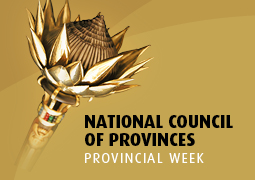
To mark the commencement of the week-long Provincial Week programme in Free State yesterday, the Free State’s permanent delegates to the NCOP and their counterparts members of the Free State Legislature received briefings from the Provincial Department of Cooperative Governnace and Traditional Affairs and Human Settlement, Department of Transport, and Bloemfontein Water Board respectively on various infrastructure projects that anchor the provincial and municipal service delivery machinery in the province.
In his presentation, the MEC on Cooperative Governance and Traditional Affairs and Human Settlement, Mr Ketso Makume, attested to the fact that there are conditional grants such as Municipal Infrastructure Grant, Dora, Water and Sanitation Bulk Infrastructure Grant, Urban Development Grant, to name a few, to ensure there’s viable bulk infrastructure to bring about integrated urban and provincial development.
Despite that, he said, the department has identified the inability of the municipalities to spend these grants due to lack of capacity as a pertinent challenge across municipalities in the province. This, he claimed, has had adverse effect on the planning and commissioning of infrastructure maintenance plans. Subsequently, this has led to many water plants not being service on prescribed schedules.
Most of all, the municipalities’ inability to spend their grants has denied them access to necessary grants to deliver on their service delivery mandates which, in turn, created a backlog on infrastructure development. He said the department has since intervened to ensure that municipalities are capacitated to spend their grants to unlock backlog of service delivery in the province.
Furthermore, he lamented the scourge of theft and vandalism of critical urban and rural infrastructure, which has had a crippling effect on the key performance areas of its programmes. Critically, the state of urban infrastructure in this province has been exacerbated by the low revenue base of many Free State municipalities and the permeating culture of non-payment by communities which contributed to the sad state of the existing infrastructure in the province.
He said what has grabbed national headlines in this province is the dilapidated state of its road network infrastructure. So bad, it has been claimed to be the worst off of all road network infrastructures in country. The MEC for Community Safety, Roads and Transport, Ms MaQueen Letsoha-Mathae, who assumed this portfolio five months ago, has vowed that she would deal with road backlog in the province head on.
She gave a detailed presentation on what intervention her department has embarked on to fix the road infrastructure network in the province. She said she has gone further to enlist various contraction companies to commence with the reconstruction of these road infrastructure projects.
To bring a transformation spin to this, she maintained that they devised a social investment component that would compel contractors to employ women in the local communities where they are appointed. She explained: “If we grant a 350 million contact to them, we demand that 1% of that which is 3.5 million must be granted to women in local communities where they are appointed.”
The Free State delegation has identified water and sanitation as one of the major concerns that have led to communities’ displeasure and protestations in the province.
The Chairperson of the Bloemfontein Water Board, Mr Tefetso Phitsane, who also presented, painted a gloomy picture of its sustainability if emergency interventions are not entered into to ensure that municipalities pay for the water services the water board provide them with and their infrastructure is on par to handle bulk water they afford them. He raised this because the existing gap between the Bloem Water and municipalities infrastructures has led to gross water losses. He cited an example in Matjhabeng Municipality, where out of 100 litres of water they provide to this municipality, 50-55% is lost due to leaks.
He said this can’t be allowed to continue if municipalities were to meet their water and sanitation service delivery mandates.” Besides, he claimed, the entire water infrastructure system of the province has to be overhauled to ensure that it is sustainable for the foreseeable future.
He further stated that the continued non-payment of services by municipalities threatens the viability of Bloemfontein Water Board. He claimed that if they were not paid what was due to them, they would not be able to provide bulk water to municipalities in future, and sadly, municipalities would not be able to provide water to communities. It is estimated that the Bloem Water Board is owned R7 billion by municipalities to date.
To alleviate the plight of municipalities with low revenue base, an alternative funding for water boards servicing non-paying municipalities should be considered, the board suggested in its presentation.
The major threat to water and sanitation in the province is vandalism and theft of key strategic assets supplying bulk water infrastructure. Worst of all, the deteriorating bulk water infrastructure in the province poses a high risk of security of water supply due to infrastructure operating close to its design limit. As such, the provision for future water demand not in line with the developments in municipal infrastructure. This will lead to the deterioration of raw water quality as a result of inadequate catchment management,” the board’s presentation claimed.
He also lamented the fact that the new water board has inherited assets and liabilities that pose a great challenge to the sustainability of the board going forward. And they were to fail to raise the necessary capital, the board would remain an ongoing business concern.
By Abel Mputing
13 September 2023

